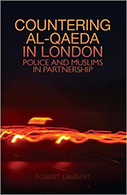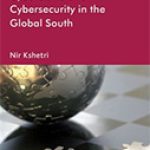Countering Al-Qaeda in London: Police and Muslims in Partnership
 Author: Robert Lambert
Author: Robert Lambert
Publisher: London: C. Hurst & Company, 2011. 402p.
Reviewer: Basia Spalek | September 2013
Countering Al-Qaeda (AQ) in London is a fascinating insider’s account of two exceptional and world-leading projects in London in which Muslim community groups partnered with police to reduce the influence of AQ linked terrorism. The author of the book, Dr. Robert Lambert, is the pioneer police officer who played an instrumental role in creating both these community-police partnerships, one based in Finsbury Park Mosque, aimed at removing Abu Hamza, the other based in Brixton and reducing the influence of AQ extremists there such as Abdullah el-Faisal. Lambert, a former Metropolitan Police Special Branch detective, draws upon his considerable experience and expertise as a counter-terrorism practitioner in order to produce a fascinating account of the challenges facing partnership approaches to countering terrorism. At the same time, he places his insider’s account within a wider body of research material in order to situate his practitioner experiences within a wider body of academic discourse. The book also stands as a powerful challenge against the critics of Lambert’s approach, who have coined the term ‘Lambertism’ to refer to the appeasement of Muslims known as Islamists and salafis. This approach stands in contrast to the dominant post 9/11 and 7/7 literature, in which radical Islam is viewed as a potent threat to Britain and the West, not only in relation to terrorism, but also a cultural and political threat to Western ideals of democracy and secularism. For Lambert (2011: 50),”effective counter-terrorism policing and effective Al Qaeda recruitment activity are both in the business of building and nurturing trust networks in the same communities.” It is therefore important to build partnerships with those individuals and groups who have some experience in, and knowledge about, extreme propagandists.
Countering Al-Qaeda in London: Police and Muslims in Partnership is divided into twelve chapters covering topics that include ”choosing Muslim partners,” ”reclaiming the mosque,” ”correcting erroneous belief,” ”challenging terrorists,” ”anger and alienation” and ”legitimacy and effectiveness.” Lambert (2011) highlights the importance of understanding the diversity and complexity of London’s Muslim population, and of the police engaging in a wholly transparent way with Muslim leaders or representatives, treating them as partners rather than informants. The author’s account is based upon his work with a new policing unit within the Metropolitan Police Service that he established in the aftermath of 9/11 — the Muslim Contact Unit (MCU). The MCU drew upon community policing principles in its more overt approach to counter-terrorism. Lambert conceptualises the MCU as adopting a partnership approach, comprised of a partnership between a counter-terrorism policing unit and members of Muslim communities in London. It is, he says, important to the development of an effective counter-terrorism policy, that the policy does not alienate the communities from which terrorists seek support and recruits:
“…although informants were an important source of terrorist intelligence – just as they were for criminal intelligence – our experience suggested that community leaders and representatives were more likely to cooperate with police if they were treated as partners and not as informants. To be an informant, in our experience, was to risk losing credibility, legitimacy and effectiveness in the communities to which they belonged. In contrast, in our experience, that credibility, legitimacy and effectiveness could be safeguarded if community leaders or representatives engaged with police in wholly a transparent manner” (p. 60).
For Lambert, the notion of partnership is best understood according to three stages: approach, engagement and consolidation. Approach is the term used to cover initial meetings between MCU officers and community representatives at which the prospect of partnership is discussed. He makes a clear distinction between the use of this term in relation to MCU, and the use of the term “approach” more generally in policing. This is because approach is often used in policing as the term
to describe the procedures surrounding a first contact between an officer and a potential informant. Engagement is the period that follows an approach when the police and community partners engage together in a joint project. This is also about having productive dialogue without necessarily having a productive partnership. Consolidation describes the period when police and community partners reflect on the work they have done together and look towards learning lessons from each other.
Lambert argues that partnerships with Finsbury Park Mosque and Brixton Mosque were based on legitimacy and effectiveness. Both Finsbury Park and Brixton were not antithetical to social cohesion, and they had community legitimacy and support as well as a strong sense of civic duty. This stands in contrast to many so-called Prevent projects that have failed as a result of not having the necessary legitimacy in order to be successful. Having myself undertaken a number of local, national and international research projects on countering violent extremism and radicalization, I would also agree with Lambert about the importance of legitimacy for the effectiveness of any community-based counter-terrorism initiatives (see Spalek, 2013). I would also take seriously his cautions against using counter-subversion tactics against community members who are perceived as potential subversives by the state — for this can increase rather than reduce violent extremism.
When I started reading this book on a flight back to London from Singapore, I could not put it down, and spent the whole 11 hours of the flight engrossed in a most absorbing read. It is such an interesting read because it combines academic rigour with insider, practitioner and community experiences. It is important to highlight that Countering Al-Qaeda in London: Police and Muslims in Partnership is the product of Lambert’s PhD research at Exeter University; research that focussed on answering the research question of how did the participants in the London partnerships conceive legitimacy and effectiveness in their work – countering AQ influence. The resulting book is that wonderful combination of experiential insight and academic analysis and reflection; thus it is a must-read for all counter-terrorism practitioners, policy officials, researchers and students of terrorism studies, policing and other academic disciplines.
Reference
Spalek, B. (forthcoming, 2013) Governing Terror: trust, community and counter-terrorism, Bloomsbury Academic Press
Professor Basia Spalek, Department of Criminology and Sociology, Kingston University, London


